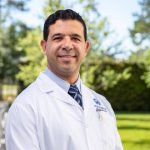
Funded by the 2019 Wine Celebration Fund a Need for Canine Comparative Oncology
Osteosarcoma (OS) is a common and devastating cancer of the bone which occurs in both dogs and humans. Upon diagnosis, the majority of dogs require amputation and chemotherapy. Despite this, most relapse within a year of diagnosis. In humans, OS is the most common bone tumor of adolescents and young adults (AYA). Pediatric and AYA patients with metastatic OS at diagnosis or who relapse after frontline therapy have an extraordinarily poor prognosis, with only a 20-30% survival at 5-years. Despite concerted attempts, these outcomes have not changed in >25 years.
Due to similarities in genetics, biologic behavior and treatment responses, canine OS is considered the best model of pediatric and AYA OS. We have used this model to investigate new immunotherapies and some of these have been translated into human trials (NCT03900793). In preliminary studies, we have determined that canine OS overexpress a protein known as B7-H3, which is absent in normal dog tissues (heart, liver, brain, kidney and spleen). We also find that both dog and human OS are infiltrated with tumor associated macrophage (TAM), which suppress immune responses to the tumor. The Dow lab has designed and tested methods to deplete these TAMs and the Verneris lab has been testing ways to target B7H3 using cellular immunotherapy with chimeric antigen receptors (CARs). Here, we will bring these two approaches together to test whether the improve outcomes in rodent xenograft models and in pet dogs with macroscopic pulmonary OS metastases in a clinical trial at CSU.

Funded by the 2020 Victory Ride to Cure Cancer
African Americans develop a form of blood cancer called multiple myeloma more often than Caucasians. On average, African Americans live less long with it. That may be in part because African Americans take part in clinical trials less often. Clinical trials are studies designed to develop new treatment drugs. Those trials can sometimes help people to live longer with this illness. We are trying to improve how many take part in clinical trials at UNC. We are creating an easier, more comfortable doctors’ office to get care at and take part in trials at UNC. We are making it easier for African American researchers at UNC to work on this important issue. We will make a video that shows what clinical research is. It will show why it can be helpful to take part in research. The video will be shown to African Americans and other patients treated at UNC. The UNC team will compare how many African Americans join multiple myeloma trials before and during this grant. If more African Americans enroll in multiple myeloma trials after the grant begins, it would show that these efforts have helped solve this problem. That may help African Americans with multiple myeloma to live longer. IT will also help make important progress in this research.

Funded by the 2020 Victory Ride to Cure Cancer
Cancer is caused by changes that happen in the genes of cancer cells. Special tests can find genes that start or promote cancer growth. New drugs can target cancer causing genes and kill cancer cells. The Duke project team wants to increase awareness and use of both the special tests and the new drugs. The project will bring a group of experts together to talk about patient cases and help find the best medicine for patients. If medicines are not available, the project team can find clinical trial options for patients. The team will also provide training to doctors and nurses on new tests for cancer genes and medicines. We will create information to help patients learn about the special gene tests and how the results can help the doctors choose the right medicine to treat their cancer. When the project is finished, the team hopes to provide the information and tools created to other local doctor’s offices and patients.

Funded by Hooters of America, LLC
Both Orleans and Plaquemines Parish in Louisiana have a higher than usual number of women with breast cancer. This is because minority women and women living in small towns are more likely to have breast cancer. These women are also more likely to die from the disease. New breast cancer treatments are tested in clinical trials. It is important to test them to see if they are safe and if they work. When women with breast cancer are deciding what to do, many never consider joining clinical trials. The women that the new drug is supposed to help are not tested. This is often because they do not know about available breast cancer clinical trials.
We will work with community leaders and physicians to give women information about clinical trials. Community members will help us make the information easy to understand. The information will be provided in many ways. Small meetings can be used to allow questions and answers. PSAs on TV and radio. Social media and podcasts can also be used.
We expect to have more women with breast cancer to consider joining clinical trials. This may result in an increased number of breast cancer survivors in these communities. By the end of this study we will have educational materials that can be shared with other women. We will also have a blueprint for developing community relationships. The names of community partners will be kept for future efforts to improve breast cancer survival in other parishes across the state.

Funded by Hooters of America, LLC
The early detection of breast cancer through screening mammogram has resulted in higher rates of cure for patients. Women are able to be diagnosed at an earlier stage and undergo less intensive treatment. Unfortunately, women from a racial/ethnic minority group are more likely to be diagnosed with advanced disease which results in higher rates of death from breast cancer. Factors that contribute to disparities include lack of access to early screening, unequal access to improvements in cancer care, and lack of insurance coverage.
Advancements in Radiation Oncology have improved the treatment of early stage breast cancer by decreasing the total treatments from 25 to only 5 treatments. This reduces the overall treatment time, making it a more convenient and cost-effective approach. However, this treatment is not readily available to underserved patients, which is evident in the fact that this group is not fully represented in clinical trials. To improve outcomes by expanding access to care for medically underserved women, we propose to partner with local organizations to make screening mammography available at no cost to uninsured or underinsured women. We will implement a study that would enroll patients diagnosed with early stage breast cancer who then have surgery to receive a 5 treatment course of radiation. The primary objective of this study would be to demonstrate that outcomes in this underserved population are similar to those established by large clinical trials.

Funded by Hooters of America, LLC
There have been significant advances in the treatment of patients living with metastatic breast cancer. Some of these advances are due to a fairly new type of technology looking at changes in the DNA of the tumor (somatic next-generation sequencing (NGS)) and/or in patient’s normal cells (germline NGS) that may impact a patient’s prognosis and/or treatment options, including the opportunity to enroll on clinical trials.
Very few studies have looked at patient understanding and knowledge on this type of advanced testing (next-generation sequencing), though of the studies available, there appears to be a low level of patient knowledge on next-generation sequencing and a gap in expectations as to how this form of testing can impact a patient’s clinical care.
The aim of our study is to increase the enrollment of patients with metastatic breast cancer into clinical trials that match patients to specific therapies based on their NGS through 1) increasing patient knowledge and understanding of NGS and 2) using the education tool to identify the change in the rate of NGS testing, as well as change of treatment recommendations based on these results.

Funded by the 2020 Victory Ride to Cure Cancer
African Americans have the highest percentage of new cancer cases in the United States and the worst outcomes. Other diverse populations have difficulty getting to a cancer treatment center or need help figuring out the system one they arrive. Some people die from cancers that can be prevented or treated, simply because they are not aware of all of the treatment options. Cancer care can be very difficult because many times a patient has more than one doctor who is part of their care team. This can be scary and may make some people choose not to get cancer treatment, even if they can be cured. WFBCCC wants to make sure that everyone has access to the best cancer care possible. This may include patients participating in research that may improve outcomes for them but also may help provide information that can help tailor treatments for the next generation of cancer patients. It is important to make sure all populations are represented in studies that look at new treatments or supports for cancer patients. To meet that goal, we created a population health navigator program- people who are from the community who can help people learn about cancer, how to prevent it, what screening is required and what treatments are available. If someone is diagnosed with cancer, the navigator will assist that person by helping to remove barriers to care and will talk with patients about clinical research as part of their care.

Funded by Hooters of America, LLC
Clinical trials test new treatments for patients. Clinical trials also help doctors learn what type of treatments work best for what patients. It is important for patients to participate in clinical trials so that we can continue to develop new treatments and improve the care of cancer patients. Very few adult patients with cancer join clinical trials. Black patients participate in trials less than white patients. We have learned several of the reasons that black patients are less likely to join clinical trials. Using what we have previously learned we will create an educational brochure designed specifically for black patients with breast cancer to see if it helps address some of the unique concerns black women have about joining clinical trials.

Funded by Hooters of America, LLC
One in every eight women will be diagnosed with breast cancer in a lifetime. But it doesn’t impact everyone equally. While Caucasian women are more likely to be diagnosed with breast cancer, African- American (AA) women are more likely to die from the disease. In addition, AA women are more likely to be diagnosed at a younger age and have a more aggressive form of breast cancer. There have been many improvements in the treatment of breast cancer leading to a lower chance of dying from the disease. But AA women have not been shown to benefit as much as Caucasian women from these advancements. There are many factors believed to be the reason for this racial difference in survival. But there is a need for more research into this area. One way to better study these factors is within the context of a clinical trial. AA women are historically less likely to be in a cancer clinical trial study. This proposed study is aimed at increasing the enrollment of AA female breast cancer patients in clinical trials at UCSD by creating a clinical trial education program to both educate and engage the community. This is predicted to lead to a decrease in the current breast cancer survival disparity.

Funded by Hooters of America, LLC
This goal of this project is to develop a new mobile application that will bring together multiple useful functions that will help breast cancer patients who are considering or participating in clinical trials. There are various applications in the market that may do one specific function but very few integrate both patient education resources with tools to help patients manage their participation on clinical trials. This includes keeping track of medication compliance, appointments, and side effects. All of these patient reported outcomes are critical for the successful completion of a clinical trial. A tool that can provide both information to breast cancer patients while helping them be compliant with the clinical trial needs could be a valuable tool as more patients depend on their smartphones and mobile devices on a daily basis.













